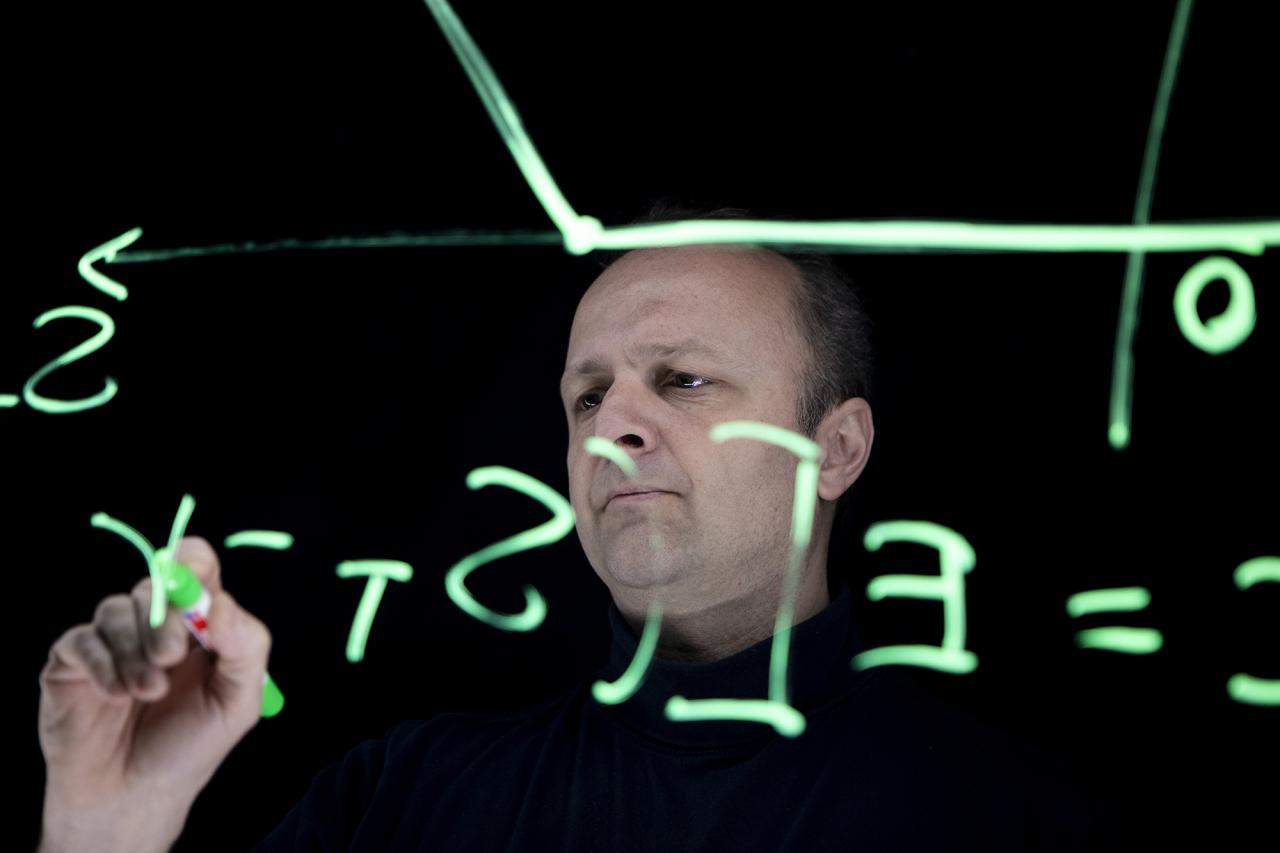Overview
Designed to give you a competitive edge, the programme offers the skills and knowledge you need to succeed in quantitative finance and insurance roles.
During the course, you’ll learn about the fundamentals of mathematics and finance to help build your technical skills. You’ll also cover pricing, hedging of financial derivatives, portfolio optimisation, risk management, data analysis, machine learning and more.
Choose the study path for you
The course is open to graduates with a mathematics degree, or related area, keen to advance their careers. With part-time and full-time study options available, you can choose the best route for you. You’ll also get to undertake a work placement or complete a supervised project.
Once you graduate, you’ll be sought after for roles like financial engineer, financial services consultant or analyst in an insurance or financial institution.
Why DCU
DCU People

I always loved maths and problem solving but I also enjoyed learning about finance.
Read more about Chris Keogh
Careers & Further Options
Careers
The increasing sophistication of financial markets has created an unprecedented need for advanced mathematics in the banking, insurance, and finance sectors.
Graduates with a wide spectrum of quantitative methods and the ability to adapt them to new situations are far more valuable to an employer than candidates with narrowly focused training.
Graduates are employed in quantitative roles in the FinTech, Financial Services and Banking industries. Typically working to determine price, analyse and manage risk, and identify profitable opportunities.
Global career opportunities
Non-EEA graduates (including those from Asia and the MiddleEast) are eligible to apply for the Third Level Graduate Programme to obtain a visa for up to two years, for the purpose of seeking employment. Numerous students from the Middle East, the Asian subcontinent and the Far East have completed this programme and returned to lucrative careers in Ireland and their home countries.
"DCU graduates are highly sought after by employers. Our Graduates work in environments ranging from large multinationals to SMEs, family businesses and start-ups across every sector.
DCU Careers Service has a number of learning and development initiatives in place for our students, giving them the skills they need for a successful career path."
Entry Requirements
For admission to the M.Sc. in Financial Mathematics
- Hold an award equivalent to an Honours B.Sc. or similar in any quantitative discipline, such as Mathematics, Statistics, Computer Science, Physics, Engineering and Economics.
- Candidates must have an honours primary degree in one of the above disciplines with not less than 50% grade in Calculus, Linear Algebra, Quantitative Methods or similar modules.
- Applicants with appropriate combinations of professional qualifications and work experience will also be considered. Recognition of Prior Learning (RPL) applicants are required to submit a cover letter along with their application under the Transcripts section of the portal, affirming their intent to apply for RPL. For more information on RPL see here.
- Candidates who are non-native speakers of English must satisfy the University of their competency in the English language. More information about DCU's English language requirements can be found here.
Programme Structure
Established in 1996, this programme is the first M.Sc in Financial Mathematics in Ireland and one of the oldest in Europe.
The DCU School of Mathematical Sciences has a long-standing commitment to teaching and research in Financial Mathematics. In 2009, it was awarded the only Stokes Chair in Financial Mathematics in Ireland. It has since attracted funding from Taighde Éireann – Research Ireland, formerly Science Foundation Ireland, with the Edgeworth Centre for Financial Mathematics and an ERC grant on market frictions. The curriculum in this programme is taught by active researchers and has evolved over time to adapt to current developments in this field.
The course can be completed in one year (Autumn, Spring, Summer) with the full-time option or in two years (Autumn, Spring, Summer, Autumn, Spring) with the part-time option.
Time commitment:
|
Online/blended/in-person: |
In person |
|
Day/evening/weekend: |
Day time |
|
Number of days on campus per week: |
3.5 |
|
Typical days(s) of week on campus: |
Monday to Thursday |
|
Typical hours per day on campus: |
3 - 6 |
|
Independent learning time - hours per week: |
10 - 15 |
Please note this information is indicative only and subject to change.
Fees and Funding
Fees
How To Apply
To apply for this programme:
- All Applicants must apply through DCU's Student Application Portal which is available here. Here's a quick step by step guide if you need help with your application.
- Academic Transcripts for each and every year of study with English translation if applicable.
- If applicable, provide evidence of competence in the English language as per DCU entry requirements. Please see link http://www.dcu.ie/registry/english.shtml
Please note if you are a non EU student and require a study visa, you are not eligible to apply for part-time programmes as study visas are only granted for full-time programmes.
Application Deadlines
Applications will be accepted on a rolling basis until the programme is full or until:
- Closing date for Non EU applicants is 1st July 2025.
- Closing date for EU applicants is 30th August 2025.
Note applicants who require a study visa for the purposes of studying at DCU, are advised to apply as early as possible.
All entry requirements should be met before the commencement of the programme.
Application Queries
For EU applicant queries, please visit https://www.dcu.ie/registry/eu-postgraduate-taught-admissions or email postgraduateadmissions@dcu.ie
For non EU applicant queries, please visit https://www.dcu.ie/registry/international-admissions-undergraduate-and-postgraduate or email internationaladmissions@dcu.ie
Commencement of Programme
The programme commences in September 2025.
Life On Campus
At DCU, our students can expect a unique campus experience. We are known for our excellent teaching and learning facilities, our active clubs and societies, and our great social and sporting facilities. All this makes DCU an exciting place to be.
DCU has three academic campuses; Glasnevin, St. Patrick’s and All Hallows (both in Drumcondra), all close to Dublin City centre.
They can be reached by public transport, Dublin Bus and Bus Éireann, with our Drumcondra campuses a ten minute walk from Drumcondra Train Station. Glasnevin is a 20 minute walk from St Patrick’s and All Hallows. They are also linked by Dublin Bus.
Each campus has a library (O’Reilly, Cregan and Woodlock Hall), study spaces, restaurants, and on-campus residencies. There are sports facilities on Glasnevin and St. Patrick’s, and there is a dedicated sports campus, St Claire’s, located near Glasnevin on the Ballymun Road.
DCU’s 19,000 students have access to exceptional teaching and learning facilities across our three academic campuses.
These include modern learning theatres, research centres, a new media and TV studio, radio/podcast studios, computer suites and advanced labs in the areas of Languages, Engineering, Physics, Chemistry and Biotechnology, as well as a Sports Performance centre and a training hospital ward. In 2021, we opened our first virtual reality ‘Leadership Lab’, which is located in our Business School.
We continue to improve and update our facilities. For example, construction of a new world-class STEM facility is underway on the Glasnevin campus. With capacity for an extra 3,000 STEM students, this facility will advance DCU’s international reputation for excellence in science and health, computing and engineering disciplines.
Studying in DCU isn’t just about course work. The university is rich in student life and activities.
There are more than 140 clubs and societies for students in DCU, with ‘Clubs & Socs’ days taking place on both the Glasnevin and Drumcondra campuses at the start of the academic year. They span everything from rugby to rock climbing, anime to jazz.
For many students, sport is an important part of the DCU experience. DCU’s Sports Complex boasts a 25 metre swimming pool, fitness centre gym, all-weather pitches and squash courts, as well as soccer, GAA and rugby pitches. DCU Dóchas Éireann, the university’s GAA club, is the largest third level Gaelic Games club in the country. Meanwhile, DCU Athletics has been Ireland’s highest achieving university club for many years. And DCU has dozens of other clubs to get involved in, from Archery to Weightlifting.
The Glasnevin campus is home to our purpose built, state-of-the-art student centre, The U, which serves the needs of a rapidly growing student body. Here, you will find the Student Leadership and Lifeskills Centre, performing arts and cultural spaces for students and the wider community, and the Entrepreneurship and Innovation Hub. Also located on our Glasnevin campus is The Helix, our renowned performing arts centre.
On our St Patrick’s campus, we have the Java Student Hub, a vibrant, warm and welcoming space where students can meet for coffee, play music, use the projector to watch events, or just relax. The walls of the Java Hub were designed based on the cultural history of St Patrick’s Campus, including the special references to the notable sporting history and history of the arts.
We have a number of academic, professional and social supports for students.
Student Advice & Learning Skills Centre - Offers a wide range of supports and services to students and advice
The Writing Centre - drop-in writing workshops for students through the academic year
Maths Learning Centre - provides maths support for students of all ability levels with maths modules
Student Learning - facilitate the transition from passive to active learning for students at DCU, by teaching study skills, nurturing critical thinking and building student confidence.
Careers work with students to help them on their professional journey into graduate employment.
Our student support team offers a comprehensive support programme, helping students make that all important transition into university life and focusing on building confidence and skills which are key to success at third level.

DCU Glasnevin Campus
FAQs
Is DCU all one campus?
DCU is a multi campus university - the Glasnevin, St Patrick's and All Hallows campuses. The St Patrick's campus is where the Education courses are taught and some of the subjects from the BA Joint Honours degree. There is a 20-25 minute walk between the campuses but there are buses and bikes available to go between them also.
Click here to see maps of all of our campuses
If I'm studying on the St Patrick's campus, can I use the library and sports centre on the Glasnevin campus?
Yes, all facilities such as sports and accommodation are open for all DCU students to avail of.
Are there libraries in DCU and if they have wifi and work stations?
We have a brand new state of the art four floor library on our St. Patrick's Campus which complements the existing library on the Glasnevin campus. There is free wifi, work stations as well as desktop computers.
Does DCU provide accommodation?
DCU does have on-campus accommodation for undergraduate and postgraduate students, and you can find out more and apply via the Accommodation Office webpage.







